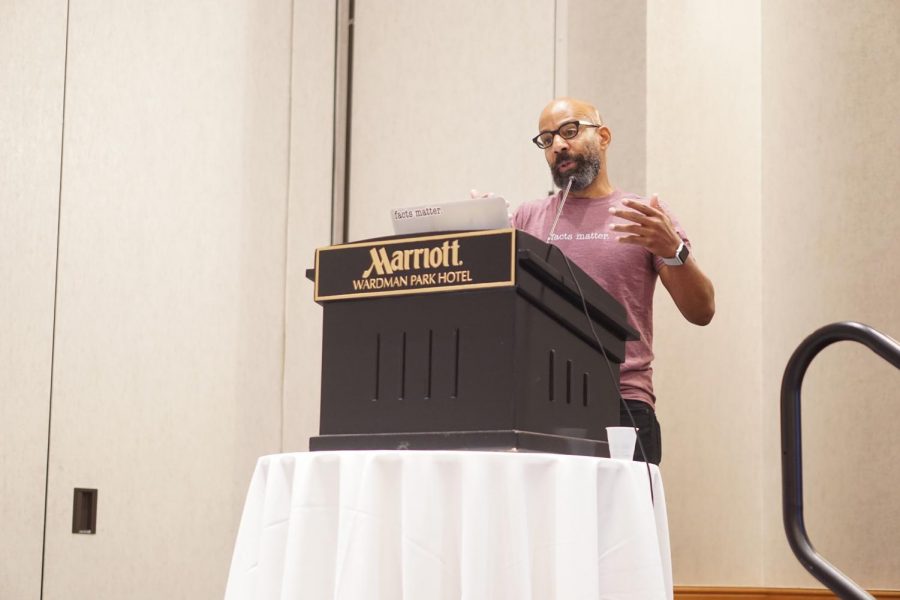Longtime sports columnist, Maryland professor argues that athletics have been part of the larger cultural landscape since Day 1. Photo by Dave Winter
Blackistone: Sports have always been political
Post columnist, Maryland journalism professor maintains that athletics have been part of the larger political landscape since Day 1
WASHINGTON D.C.—In an amazingly comprehensive session at the NSPA/JEA Fall National High School Journalism Conference in Washington DC, Washington Post sports columnist and University of Maryland professor Kevin Blackistone set out to debunk the notion that the sports section can or should be free from political conflicts or ideologies.
The idea that today’s athletes are the first to connect sports with politics is simply inaccurate, Blackistone said.
Rather than “a toy department of journalism,” he argued that sports now and sports historically have always had a political component and have reflected, and in many cased affected, contemporary political, cultural, religious and socioeconomic struggles.
To prove this argument, he started his session with the example of the original Olympics in ancient Greece. The first marathon started in the town Marathon, the site of military victory of the Athenians over the Persians. Pheidippides, the victor in the marathon, from Marathon ran 26.2 miles to Athens to announce that the Greeks had defeated the Persians in battle. According to legend, he delivered the message “Niki!” (Victory!) then collapsed and died. Those original Olympic games were always preceded by a military truce. Likewise, in 1845 in the United States, war broke out between the Senecas and Eries after the Erie, upset that they had been bested in a ball-game very similiar to lacrosse, challenged the victorious Seneca to a foot race and then a wrestning match and lost them, too. Humiliated, they decided to declare war on the Seneca the larger League of Five Nations and then lost that contest, too.
In the case of African-American jockeys in antebellum America, sports provided an avenue to gain the wealth to purchase freedom.
Blackistone pointed to the formation of the YMCA in the 19th century as a time when sports were seen as an antidote to industrialization that would promote model citizenship. As part of that cultural endeavor, sports like volleyball and basketball were born.
But while sports have been a ways to advance a cultural agenda, Blackistone said they have also been a frequent target for social protesters seeking to promote their cause.
As an example, he told the story of Emily Davidson, a protester who was trampled and died after crawling onto a track during the last run of horse race and trying to pin on a horse a banner promoting women’s suffrage.
Sometimes, he continued, sports are not a target of cultural action but rather a means to preserve inequalities. To illustrate this aspect of the fusion of sport and politics, Blackistone pointed to the segregated baseball and football teams of the early 20th century, which maintained a Reconstruction-era racial separation in some cases into the 1960s.
“Sports have always been a leader in the retardation of social change in this nation,” he said.
When John Carlos and Tommy Smith raised their fists at the medalist podium at the 1968 Olympics to protest racial injustice, the two were kicked out of the Olympics and stripped of their medals. More recently, in 2003, Maryville College women’s basketball player Toni Smith turned away from the flag during the national anthem to protest America’s escalation of the Iraq war and Tim Tebow purchased a Super Bowl ad to promote pro-life beliefs.
After establishing the longstanding connections between sports, politics and culture, Blackistone introduced contemporary examples, most notably, the well-known saga of Colin Kaepernick, the former NFL quarterback who in his sixth season in the NFL opted not to stand during the national anthem in order to protest police brutality and racial inequality in the United States. His actions drew praise, emulation and criticism. At the end of the 2016 season, his contract was not extended, and he has been out of professional football ever since.
In the question and answer session following Blackistone’s prepared comments, he discussed recent failed efforts to keep sports isolated from politics at Deadspin and at ESPN.
